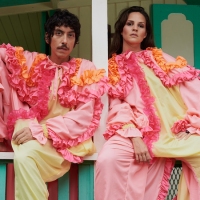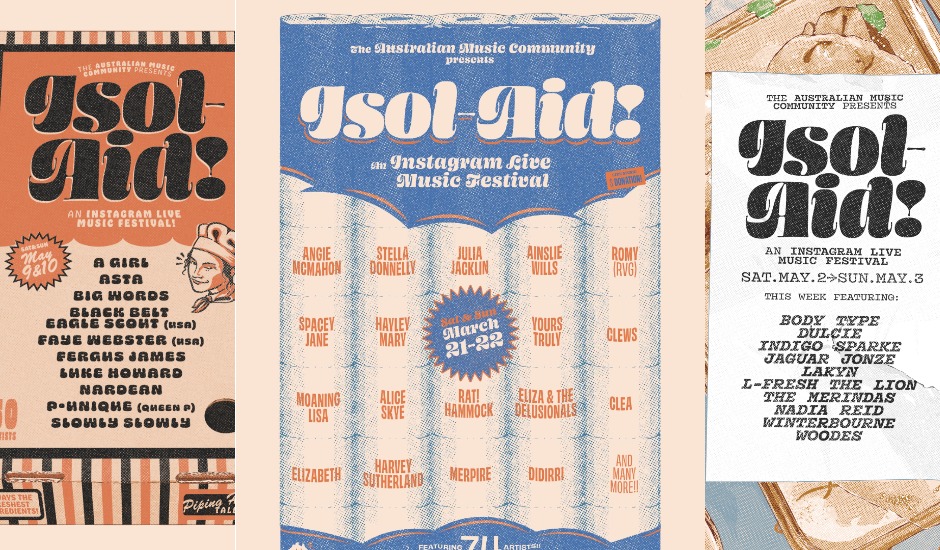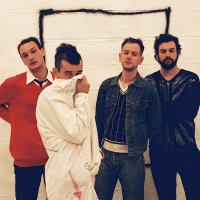 Returning to Puerto Rico with Buscabulla: “This is our journey.”Years since leaving their home in search of fame, Buscabulla didn’t feel like themselves - and that needed to change.
Returning to Puerto Rico with Buscabulla: “This is our journey.”Years since leaving their home in search of fame, Buscabulla didn’t feel like themselves - and that needed to change.

The magic of Isol-Aid, a source of musical hope in trying times
After a runaway first event, the online festival has blossomed into a pioneer of live music in a COVID-19 world.
At the beginning of this year, it felt like Australian festival culture was hitting a new peak. While discussions about lineup uniqueness and diversity continued into the 2019/2020 festival season, there was positive growth in a lot of areas: festivals were reaching more places with larger audiences, using lineups that were gradually becoming more inclusive, unique and all-around strong. Long ignored, regional cities were blossoming into a newfound market for tour promoters, and festivals such as Laneway pushed their events to near-all-ages, providing defining music experiences for teens that otherwise would miss out, and have missed out since the death of Big Day Out et al.
Then, came what we’ve all had to experience in the last few months. We aren’t going to harper on with the negatives - there are ‘conventional’ news sites for that - but the effects of the ongoing COVID-19 pandemic has been near-apocalyptic to both the Australian music industry and the greater festival culture it supports; every festival - big, small, inner-city, regional, all-ages or not - have had to rethink their strategies in 2020, and not a single one is able to continue in their previous form - at least for the next two years.
In some cases, festivals are being modified to continue. Falls Festival - whose 2019/2020 event survived, having occurred prior to coronavirus’ spread - will push ahead in 2020/2021 with an all-Australian lineup, and Laneway Festival - which also survived in 2020 - will reportedly do the same. Some festivals have been optimistically postponed, others such as Groovin the Moo have flat-out cancelled their events, and are taking a moment of down-time to focus on growing in 2021. As a result of coronavirus, the live music industry in Australia has fallen to near-none, and on the other side come restrictions and red tape - international musicians, for example, are expected to be banned from entering Australia until at least next year.

Courtney Barnett, Montaigne and Marlon Williams playing Isol-Aid. Image source: Oztix.
“From death comes life” is a somewhat cliché often muttered after bushfires, but in the context of Australia’s live music industry, it’s becoming applicable. In the wake of COVID-19, a new kind of festival has emerged: completely online, viewable in the comfort of your own home, and open to anyone who can stream, regardless of age, location or class.
Isol-Aid was one of the first - the first event was streamed the same weekend as the international travel ban came into action - and over the last eight weeks, has become somewhat of a defining force in Australia’s live music scene post-COVID, continuing on with regular events every weekend. In its first week, the festival hosted Angie McMahon, Stella Donnelly, Julia Jacklin as a driver to Charlotte Abrom’s Support Act fundraiser; Abrom, an artist manager who works with McMahon, Ainslie Wills and Haarlo, capping the fundraiser as it hit $50,000 last month (a greater fundraiser, the Support Act Emergency Fund, has over $800,000 of donations). In the time since, the festival has grown to include some of Australia’s defining acts (Courtney Barnett, Sarah Blasko, John Butler and POND’s Nicholas Allbrook included); incorporate labels, booking agencies and record stores as co-presenters; released merch, launch websites and activate other streaming mechanisms; even going as far to launch an international edition, co-curated by Gordi.
“It initially started as an idea with Melbourne musician Merpire,” says Emily Ulman, one of the festival’s co-founders that now spearheads the project on her own, and oversees everything that goes into the event week-in and week-out. “We decided to contact all of our artist friends and pitch them a 20-minute set on Instagram Live, which when the full lineup was built, could stretch from midday to midnight, both Sunday and Sunday.” Initially, the event was launched as a passion project between Ulman (who prior to Isol-Aid, worked for Brunswick Music Festival, a Melbourne event cancelled last-minute in the face of COVID-19) and Merpire; an event that would bring live music to people without jeopardising social distancing regulations, all while raising money and awareness for corporations built to protect and take care of the music industry in trying times. That quickly changed as the event kicked off.
“From the first or second act of the festival, we knew we were going to do another one. The reaction was so overwhelmingly positive, and there was a special community building in the comments,” continues Ulman, and that there was. As Angie McMahon stripped back Lana Del Rey as a part of her performance, the thousand-strong online crowd cried along (well they said they did anyway, but considering the emotive potency of her performance, they probably weren’t lying). Julia Jacklin was met with a wave of positive reinforcement as she accidentally forgot the words to Pressure To Party, and as Melbourne duo Cry Club played their single Obvious, a stan culture of-kinds quickly erupted, telling passersby to ‘stream Obvious on Spotify.’
“Isol-Aid has done an incredible job of giving artists a platform to share an intimate performance of their music and somehow fostering a feeling of community and togetherness that exists at Australian music festivals on Instagram,” says Alex The Astronaut, who performed at the online event in its second week and saw this community-built aspect first-hand. “In a really dire time, they’ve managed to lift people up and done so while including smaller artists who maybe wouldn’t get the opportunity to be seen at some of the bigger festivals.”
Despite growing over the last eight weeks (and into its ninth this forthcoming weekend), the values that underpin Isol-Aid’s inception haven’t changed. The festival still focuses on artist support and fundraising (and with social media platforms scrambling to include tip jar-esque functions on live streams, the fundraising aspect of the show may become a lot easier), and the community aspect that thrived amongst Isol-Aid’s beginning still exists, becoming an unexpected star of the festival every week. “Things have changed here and there, but the core values haven’t changed,” re-affirms Ulman. “It’s still all about the Australian music community, both in wanting to raise money for it and building a platform for it,” she continues (it’s worth noting too, that at the top of every week’s poster, Isol-Aid is ‘presented by the Australian music community’).
In many ways, Isol-Aid captures the wholesomeness of the Australian music community better than Australia’s festivals do. In almost every performance, comment streams are lit up by other musicians giving support, regardless of whether they’re friends in real life or just admiring from afar. Likewise, comments from non-musicians are often peak in pureness, despite the internet’s unfortunate tendency to drag literally anything through the mud. “Isol-Aid is the perfect example of what I love most about the Australian music scene - the strength of community,” explains Brisbane songwriter Jeremy Neale, who was the very first musician to play Isol-Aid in its opening week.
As Neale points out, Isol-Aid is also successful in removing barriers that prevent live music from reaching certain people. For an act the size of Neale, for example - who doesn’t have the touring budget of someone like Tame Impala - Isol-Aid allows them to perform for audiences they can’t visit, including regional fans, international fans, and fans under 18. “I'm a huge fan of the accessibility of the festival in terms of cost, both logistically for the artist to perform and for attendees,” Neale continues. “A lot of people are hurting financially and to be able to see and connect with their favourite artists totally rules.”
It’s a sentiment agreed on by many musicians who have played Isol-Aid in the past two months. “A wholesome side-effect of the gig was also the fact that our international fans had the chance to see us perform for the first time,” explains Cry Club, who as a still-developing duo, haven’t had the opportunity to perform outside of the east coast of Australia. “We had messages from people overseas who were thrilled to see us play, and it’s given us a new connection with those fans.” Similarly, much like it gives musicians the opportunity to perform in the comfort of their own home, it likewise gives audiences the opportunity to do the same. For some people, this may mean watching a band like Slowly Slowly in their pyjamas on the couch, but for others, it means being able to watch Slowly Slowly without the anxiety and stressors of a large-scale show, or without having to worry about disability access or the threat of strobe lighting causing epilepsy.
“I just want to focus on different parts of our music community and really highlight that we are all in this together,” continues Ulman, on how Isol-Aid’s focus on the Australian music community hasn’t changed despite its ongoing growth. “We are all in the same situation.”

Carla Geneve, Cry Club, Angie McMahon and others have played Isol-Aid so far. Image source: Oztix.
As for what’s next? Isol-Aid, much like everyone else, are taking things as they come. “I'm just enjoying it for what it is at the moment, and I feel like it would be premature to start talking about what it might become - I’m not in any hurry,” explains Ulman, when asked about the future paths Isol-Aid can travel down. Changes are happening though. In the past few weeks, Ulman has enlisted co-curators such as Select Music and Island Records to beef up programming, especially as the number of Australian artists who haven’t played Isol-Aid dwindle (natural, considering it’s booked a Falls Festival-sized lineup every weekend for the past eight weeks). Furthermore, off the back of the Gordi-curated international edition a few weeks back, a few more global faces are finding themselves on the lineup; last week’s event, for example, included Atlanta folk singer Faye Webster.
Otherwise, many of the changes are behind-the-scenes. Highlighting the collaborative, community-built aspect of Isol-Aid, sponsors have jumped on to take Isol-Aid to the next level, bolstering its presence and allowing the festival to grow both in real life, and digitally (of course). Soon, when live shows re-open and a festival like Isol-Aid is no longer strictly necessary (but hopefully, still around), you’re likely to see jumpers blazen with “l stayed at home and all I got was this festival” - a merch line that has all proceeds going to Support Act.
In the meantime though, the crew behind Isol-Aid just want everyone to stay healthy - both physically and mentally. As restrictions ease and self-isolation becomes less emphasised, still make the time to check in on one another and make sure everyone's doing the best they can in every way. The longer people look after one another, the milder the ongoing results of COVID-19 continue, and we can all go back to seeing live music a little quicker, something the artists are keen for too - “In a way, playing shows was one of the most stable parts of our lives, and so not being able to do that has been a challenge,” confirms Moaning Lisa, another Isol-Aid alumni.
If we do come out of the other side of this with one thing though, I hope it’s a heightened appreciation for the Australian music community, who once again - through pandemics and bushfire emergencies alike - continue to be one of the most wholesome, supportive and angelic communities there is, no matter what they face. Isol-Aid has been integral in bringing this aspect to our music community in the light again, and despite all the brilliant performances by all the brilliant acts the festival has hosted over the past few months, we hope this is what Isol-Aid is remembered by.
Isol-Aid #9 will run this weekend (May 16/17), with a lineup to be announced.
 Returning to Puerto Rico with Buscabulla: “This is our journey.”Years since leaving their home in search of fame, Buscabulla didn’t feel like themselves - and that needed to change.
Returning to Puerto Rico with Buscabulla: “This is our journey.”Years since leaving their home in search of fame, Buscabulla didn’t feel like themselves - and that needed to change.
 Striving for boldness (and avoiding boredom) with The 1975On The 1975’s genre-fleeting new record Notes On A Conditional Form, the UK band attempts to make sense of the madness.
Striving for boldness (and avoiding boredom) with The 1975On The 1975’s genre-fleeting new record Notes On A Conditional Form, the UK band attempts to make sense of the madness.